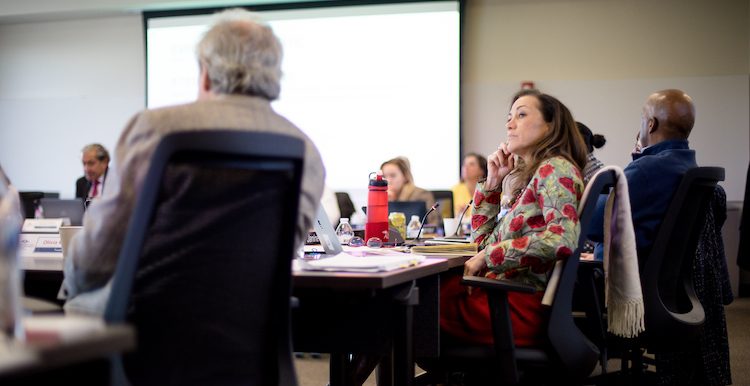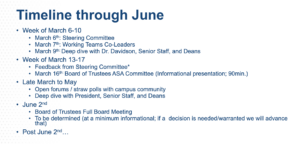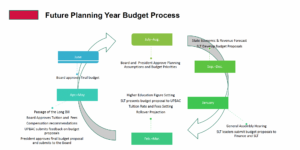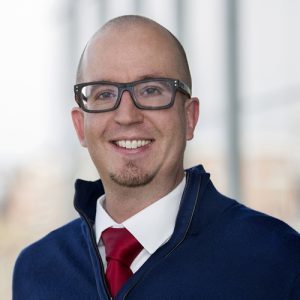

At the Metropolitan State University of Denver Board of Trustees Academic and Student Affairs Committee meeting Thursday, President Janine Davidson, Ph.D., framed the faculty-workload discussion from January’s board meeting and subsequent work since. She outlined similar previous proposals and the subsequent creation of a Cross-Functional Task Force, which was established immediately following the previous meeting.
Steering committee co-chairs Marie Mora, Ph.D., interim provost; and Meredith Jeffers, Ph.D., faculty trustee and associate professor of Spanish, led the board through background analysis and initial findings. MSU Denver has undergone such institutional changes as becoming a university in 2012; a nearly doubling of undergraduate-degree majors in the past 15 years; a tripling of graduate-level degree programs since they were first approved in 2010; and shifting demographics. These changes underscore an ever-increasing need for dynamic teaching and increased student engagement in high-impact practices, Mora and Jeffers reported. Pandemic-expedited changes in technology and course modality options as well as such factors as a rising cost of living and decreased state funding together with the aforementioned factors have compounded into a landscape that isn’t necessarily reflected in policies and practices, they said.
Common themes so far have included:
- Defining workload, as individual experiences vary greatly.
- A need for differentiation to make sure work is sustainable, focused on students and mission-driven across departments and courses.
- Policy and practice understanding of “how a bill becomes a law” and that expectations of teaching, research and service are clear from the point of hire.
- Compensation concerns that are extended to include nonfaculty staff.
- Combating perceptions of opacity in budgeting.
Jeffers reiterated questions posed during a prior analysis: “Who are we? Who do we serve? How can we craft sustainable, student-centered workloads that align with our University’s mission and strategic plan?”
“The bottom line is that higher ed has changed and MSU Denver has changed. That’s not a criticism, but the reality is we’re experiencing growing pains,” she added.
Mora and Jeffers detailed next steps involving data-collection analysis (which is already underway) continuing through May. Following were discussion and closing feedback loops with faculty and other key stakeholder groups; identifying feasible options; and drafting recommendations for update at the June 2 board meeting. Jeffers clarified that not pushing for fall implementation will allow the task force to get infrastructure in place to make an informed decision that won’t put the University and, in turn, all MSU Denver students at risk. Ongoing infrastructure and long-term budget modeling is anticipated to take place throughout summer and into fall.
“Something needs to change — but if we do this right, we’ll end up with a new normal for faculty, staff and our entire enterprise,” Davidson said Thursday.
 At the Friday board meeting, Faculty Senate President Liz Goodnick, Ph.D., thanked trustees for the approach so far and expressed optimism, along with reading a resolution detailing areas of concern. Also, Student Trustee Gabriel Trujillo read a statement from the student government in support of the faculty.
At the Friday board meeting, Faculty Senate President Liz Goodnick, Ph.D., thanked trustees for the approach so far and expressed optimism, along with reading a resolution detailing areas of concern. Also, Student Trustee Gabriel Trujillo read a statement from the student government in support of the faculty.
State budget and legislative efforts
Director of Government Affairs Kaycee Gerhart updated trustees on state-legislative-related matters. Higher-education funding is not yet finalized, but it is expected to grant institutions the authority to increase tuition. Though the University remains committed to minimizing the growth in tuition rates for students, an increase may be necessary if Colorado higher-education institutions are not fully funded as outlined in a January joint request. The state’s budget situation remains challenging, and efforts are being made to encourage more investment in the Joint Budget Committee process.
Capital funding updates include some projects being recommended for funding (including ongoing Auraria Higher Education Center heating/ventilation/air-conditioning upgrades and Information Technology Services-related requests). Others, meanwhile, such as new builds of the Classroom to Career Hub and the Health Institute Tower, are not for this legislative cycle. Several state bills are being tracked, including one expanding assistance for educators (HB 1001), while ones on selective-service requirements and a “universal scholarship” are expected.
Gerhart also provided a briefing on the Colorado Commission for Higher Education’s strategic plan, signaling the organization’s agenda for the next five years. The plan’s three strategic pillars include improving negative return-on-investment pathways, enabling positive ones and increasing post-secondary-workforce collaboration. MSU Denver has many promising related practices already in place, including concurrent enrollment, stackable credentials, apprenticeships and industry-informed curriculum.
Gerhart offered initial reflections on the plan, identifying several areas of alignment in regard to connecting the academic experience to workforce needs while calling for measures beyond earnings and consideration of nonmonetary benefits such as civic and societal impact. More details and discussion are expected in June.
Budget-process changes
Trustee Russell Noles provided a Financial Committee update, detailing items discussed in Thursday’s meeting.
Highlights included audit findings from University Controller Liza Larsen, noting two deficiencies (a case of misappropriated Financial Aid funds and HEERF reporting compliance) and a need to ensure that ITS access is removed when employees separate from the University. Controls and strategies are being put in place, and further follow-up will be reflected soon.
 Additionally, CFO Jim Carpenter outlined the University’s budget process and detailed how MSU Denver is moving from a two-phase, enrollment-dependent budgeting approach to a single-stream forecast and the development of a policy guiding fund-balance management. “Budget is the strategic plan written in numbers,” Carpenter said. “Our budget process needs to drive us toward efficiencies and our expenditures and toward revenue generation.”
Additionally, CFO Jim Carpenter outlined the University’s budget process and detailed how MSU Denver is moving from a two-phase, enrollment-dependent budgeting approach to a single-stream forecast and the development of a policy guiding fund-balance management. “Budget is the strategic plan written in numbers,” Carpenter said. “Our budget process needs to drive us toward efficiencies and our expenditures and toward revenue generation.”
‘Changemakers Wanted’ ad campaign
Whei Wong, associate vice president of Marketing and Brand, provided the trustees with an overview of the University’s new brand-platform refresh, titled “Changemakers Wanted.”
To inform messaging and strategy, a statewide sentiment survey was conducted to gather perceptions of MSU Denver and identify areas to reinforce the brand, with the goal to increase awareness and attract prospective students. The survey found that affordable tuition, desired programs and campus safety were the top decision factors for all age groups.
The new ad campaign to support this will feature bold imagery of current students and faculty, Wong said. Target audiences are broken down by age and college, with a focus on specific cities and out-of-state locations. Various sources, including interviews with senior leaders, historical data and student input, helped guide the campaign’s development.
The rollout is in Phase 1 with a soft launch, and Phase 2 will focus on retention through location-specific ads and messaging that reinforces perseverance and persistence, Wong added.
Advancement successes; new partnership promising for campus housing
Christine Márquez-Hudson, vice president of University Advancement, updated the board on successful efforts of the school’s fundraising arm.
Highlights included:
- $11.3 million raised for fiscal 2022-23 (vs. $10.5 million in 2021-22), 75% of the way to the year’s goal of $15 million.
- $35.76 million raised 18 months into the University’s five-year campaign (48% of the total goal).
- $15.2 million going directly into scholarship and student-success funds this year.
Márquez-Hudson said this is a result of investments in Advancement coming to fruition and called on everyone present to support MSU Denver’s video-game-themed Day of Giving on March 30 (campaigns live now) to the best of their ability.
“The seeds are being planted, the relationships cultivated, and resources are finally coming home to MSU Denver,” she said. “We finally have an ecosystem of focus and people necessary to achieve success.”
Chief Strategy Officer James Mejia joined Márquez-Hudson to provide an overview of a proposed partnership that would offer meeting and office space to house the C2Hub, the Early Learning Center, Gary Community Ventures and AHEC. The space would be alongside 350 units of mixed-income housing with a portion reserved for MSU Denver faculty and staff members.
Mejia said the next steps for the proposal include developing a memorandum-of-understanding with AHEC, refining the financial path forward, revising the University’s proposal to the state and bringing a full plan to the Board of Trustees at a date to be determined.
“The lack of affordable housing near campus directly affects our ability to attract and retain staff and faculty, and … we need a place to host employer and industry resources (such as the C2 Hub),” he said, also stressing the preliminary nature and low-risk approach to the project.
More news and notes
- Roadrunner Maya Ries was introduced by Athletic Director Todd Thurman to share her story of resilience. After tearing a knee ligament twice and encountering other personal obstacles, she has become the fastest hurdler in MSU Denver history, breaking her own record nine times. Read more about Ries’ story here in RED.
- The board unanimously approved an associate degree in General Studies. In the Thursday Academic and Student Affairs Committee meeting, Shaun Schafer, Ph.D., said the degree program was applicable to stopped-out students who have completed 70 or more credit hours but have not received a degree or credential. The program is the result of legislation designed to get more post-secondary credentials into the hands of Coloradans who have significant debt and nothing else to show for it.
- Davidson noted the third anniversary of the University’s pandemic shutdown and thanked the community for its dedication and work throughout difficult times. “Today is that inflection point. … We’re recommitting to student-centric success, reassessing how we support our faculty and staff and launching into a model of serving students in the 21st century,” she said.
- Davidson also acknowledged retirees (Carlos Frésquez, professor of Art; David Lynn Hoffman, Ph.D., professor of Management; Rob Ingle, senior program manager in Learning and Development; and Karen Lollar, Ph.D., professor of Speech Communication) who were honored at the recent Spring Update, provided an update on the Health Institute’s Sim Lab progress and highlighted the following dates/events:
- March 30 — MSU Denver Day of Giving
- April 6 — Roadrunners Who Soar Awards
- April 26–28 — City Summit of the Americas (MSU Denver is a host site)
- May 12 — Commencement


